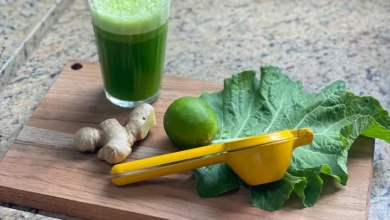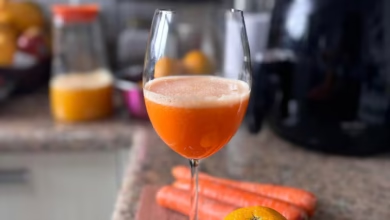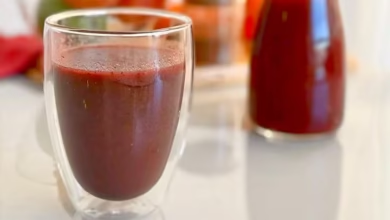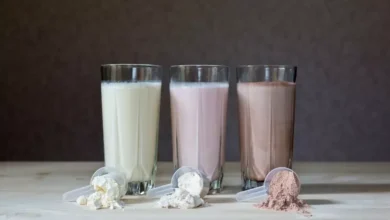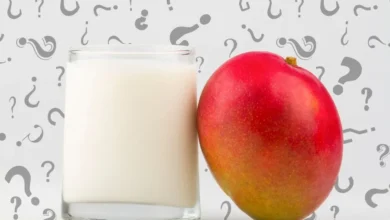Sweet, Nutritious, and Functional: The Acai and Banana Fitness Smoothie
Blackberry and Banana Fitness Smoothie
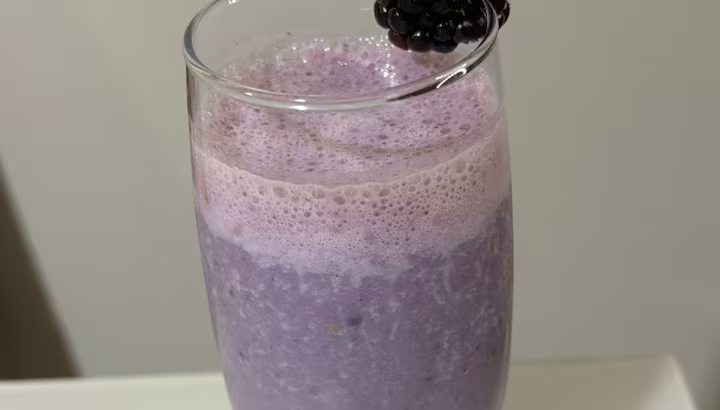
The quest for a healthier lifestyle has fueled the popularity of functional smoothies, transforming simple fruit blends into practical, nutritious meals. The combination of blackberry (amora) and banana, boosted by whey protein, emerges as one of the most sought-after fitness recipes, blending flavor, satiety, and a powerful nutrient boost.
This recipe, highlighted by Estadão Paladar and created by clinical nutritionist Aline Braz, proves that health and flavor can go hand in hand, without the need for lengthy culinary processes.
READ ALSO:
- Apple Carrot Blueberry Juice: A Nutritious Drink for Energy and Wellness
- 3 Shakes for Rapid Muscle Growth: Vitamins for Fast Hypertrophy
Follow our PAGE
Recipe: Acai and Banana Fitness Smoothie
- Difficulty: Easy
- Prep Time: Fast
- Serves: 1
Ingredients
- 1 medium frozen banana
- 1/2 cup of frozen blackberries
- 30g of Whey Protein (vanilla or white chocolate flavor)
- 100ml of water or skim/plant-based milk
Instructions
- Place all ingredients in a blender or food processor.
- Blend until the mixture is homogenous and reaches a thick, pasty consistency (the characteristic of a smooth smoothie).
- Serve immediately.
The Nutritional Power of the Acai and Banana Fitness Smoothie
The secret to this smoothie lies in the synergy of its ingredients, which provide a complete nutritional profile for energy, muscle recovery, and immune system strengthening.
Blackberries: The Source of Antioxidants and Immunity
Blackberries are often underestimated, yet they are a nutritional powerhouse, especially when consumed frozen, which helps maintain their properties.
- Rich in Vitamins and Minerals: The fruit is packed with calcium, Vitamin C, magnesium, fiber, flavonoids, and Vitamin A. This combo is essential for bone health (calcium), nerve function (magnesium), and vision (Vitamin A).
- Anti-inflammatory Action: The flavonoids in blackberries are powerful antioxidants that fight free radicals and act as anti-inflammatory agents, aiding in body recovery, especially after exercise.
- Fiber for Gut Health: The high fiber content contributes to satiety, helps regulate bowel transit, and is beneficial for controlling blood sugar levels.
Banana: Energy and Potassium for Performance
Banana, the base of any creamy smoothie, not only contributes to the texture but is a vital source of energy and electrolytes.
- Fights Cramps: Famous for being rich in Potassium, bananas are crucial in preventing muscle cramps, making them a favorite fruit for athletes and exercise enthusiasts.
- Sustainable Energy Source: Bananas provide essential carbohydrates for the body, offering energy gradually thanks to their soluble fibers, which also promote digestive health.
- Cardiovascular Benefits: The potassium and low-fat content of bananas are noted as elements that can help improve blood cholesterol levels and regulate blood pressure.
Whey Protein: Focus on Satiety and Lean Mass
The addition of whey protein transforms the drink from a simple juice into a complete functional food, aiding in muscle building and weight management.
- Muscle Recovery: Whey protein is a high biological value protein that supplies essential amino acids for repairing and building muscle mass, which is crucial for those seeking fitness results.
- Increased Satiety: Protein is the macronutrient that provides the greatest satiety. When added to the smoothie, it helps prolong the feeling of fullness, which is essential for weight control diets and for avoiding high-calorie snacks between meals.
The Importance of Consistency: Why Freezing is Essential
The key to a professional-quality smoothie is using frozen ingredients.
The Perfect Texture
Unlike a regular shake, which uses ice or only chilled fruits, the smoothie requires a dense, pasty, and very cold texture. Frozen banana and blackberry fulfill this function, acting as the base for a natural “ice cream” without added fat or refined sugar.
Nutritional Optimization
Freezing fruits at their peak ripeness not only preserves them but, in many cases, helps maintain their vitamin and antioxidant content, ensuring the smoothie is as nutritious as possible. The frozen blackberry provides the vibrant color and balanced acidity that contrasts with the sweetness of the banana.
How to Incorporate the Smoothie into Your Fitness Routine
The blackberry and banana smoothie is versatile and can be adapted for different times of the day and diet goals.
Pre or Post-Workout
- Post-Workout: The combination of carbohydrates from the banana and protein from the whey is ideal for the muscle recovery window, replenishing glycogen stores and repairing muscle fibers.
- Pre-Workout: Consumed about 30 to 45 minutes before exercise, it provides the necessary energy for performance without causing a heavy feeling or discomfort.
Light Meal Replacement
Due to its balanced composition of carbohydrates, proteins, and fibers, it can replace a light breakfast or afternoon snack nutritiously, provided it is part of a meal plan designed by a health professional. The choice of liquid (water, skim, or plant-based milk) can modulate the caloric density and suitability for dietary restrictions (such as lactose intolerance).
Conclusion
The Acai and Banana Fitness Smoothie is the embodiment of functional eating: quick, delicious, and purposeful. It proves that fitness cuisine does not have to be complex. By uniting the antioxidant properties of the blackberry, the energy of the banana, and the muscle support of the whey protein, this recipe establishes itself as a smart choice for those looking to maximize nutrition and well-being. Its simplified preparation, based on frozen ingredients, guarantees the ideal texture and convenience for a modern life, confirming that health and flavor can be achieved together, without the need for long cooking processes.

Hello! My name is Alan Teixeira and I am passionate about helping people live healthier, more balanced lives. From mindful eating to daily habits that promote physical and mental well-being, I believe that small, consistent changes can lead to powerful transformations.
I created this blog to share practical tips, reliable information, and thoughtful insights that can inspire you to take better care of yourself—with balance, mindfulness, and positivity.
If you are looking to improve your health, nourish your body, and build a lighter, more fulfilling routine, you are in the right place. Welcome!

